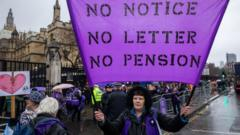Image source, Getty Images
By Jennifer Clarke
BBC News
Millions of women affected by a decision to increase the state pension age will not get compensation, the government has said.
It accepted that changes affecting women born in the 1950s weren’t communicated quickly enough. However, Work and Pensions Secretary Liz Kendall rejected a recommendation to pay them up to £2,950 each.
How has the pension age for women changed?
The modern state pension was introduced in 1948.
Men who had made enough National Insurance (NI) contributions received their state pension at 65 and women at 60.
However, in 1995 the then Conservative government introduced a timetable to make the age at which men and women start getting state pensions the same.
The state pension age for women would gradually rise to 65, between 2010 and 2020.
In 2010, the Conservative-Lib Dem coalition government decided to speed up the changes, to reduce the overall cost of the state pension.
The Pension Act 2011 brought forward the qualifying age of 65 for women to 2018.
In 2020, the state pension age for both men and women increased to 66.
Under current plans, the state pension age is set to rise again to 67 between 2026 and 2028, and to 68 between 2044 and 2046.
What is the Waspi campaign, and who are the women affected?
About 3.6 million women were affected by the 1995 decision to increase the pension age to 65.
Of those, 2.6 million were affected by the decision to bring the date forward to 2018.
The Women Against State Pension Inequality (Waspi) campaign group, external has held protests about the issue and lobbied successive governments.
It does not oppose the equalisation of the state pension age for women and men.
However, it wants women affected to be compensated because it says the government failed to tell them – or provide adequate notice – about the change
Read More





